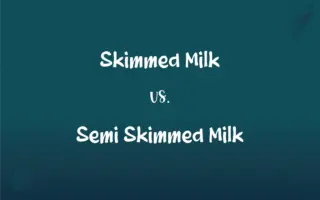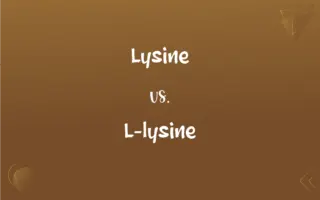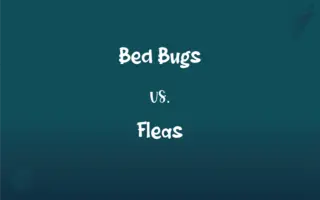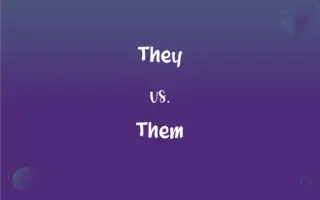Dreads vs. Locks: What's the Difference?
Edited by Janet White || By Harlon Moss || Updated on October 3, 2023
Dreads and locks are often used interchangeably but typically, "dreads" refers to dreadlocks, a matted and knotted hairstyle, while "locks" is a general term for hair sections.

Key Differences
Dreads, often short for dreadlocks, have roots in various global cultures but are particularly tied to the Rastafarian movement from Jamaica. Locks, on the other hand, is a universal term that simply refers to sections or tufts of hair.
In the context of hair, when people mention dreads, they usually refer to a specific style where the hair is allowed to mat or twist into tubular coils. Locks, while often used synonymously with dreads, might not always carry the same cultural or stylistic significance.
It's also notable that dreads can sometimes be seen as a loaded term, with historical and cultural implications, especially regarding African and Caribbean communities. Locks, being a more neutral term, doesn't typically bear these implications.
While dreads inherently suggests a knotted, uncombed nature of hair, locks can be temporary or permanent, matted or simply sectioned.
Comparison Chart
Terminology
Short for "dreadlocks."
General term for hair sections.
ADVERTISEMENT
Cultural Ties
Strong ties with Rastafarianism.
No specific cultural ties.
Implication
Often matted and knotted.
Might not be matted or knotted.
Neutrality
Can be a loaded term.
More neutral in connotation.
Duration
Typically permanent.
Can be temporary or permanent.
Dreads and Locks Definitions
Dreads
Short, matted coils of hair.
She decided to grow dreads after visiting Jamaica.
ADVERTISEMENT
Locks
A mechanism for keeping a door, lid, etc., fastened.
She forgot the combination to her locks.
Dreads
To anticipate with great apprehension or fear.
He dreads the upcoming finals week.
Locks
Engage or become engaged securely in position.
The two gears locks into place.
Dreads
A person with dreadlocks.
A group of dreads were jamming to reggae music.
Locks
A stretch of water enclosed by gates in a canal or river, adjusting the water level.
The boat waited to pass through the locks.
Dreads
Things considered to be very bad or formidable.
The many dreads of war include loss of innocent lives.
Locks
A hold in wrestling or self-defense.
He got his opponent in a head lock.
Dreads
A feeling of great fear or apprehension.
The thought of speaking in public filled him with dreads.
Locks
Tufts, clusters, or sections of hair.
His golden locks shone in the sunlight.
Dreads
(colloquial) dreadlocks
Locks
A device operated by a key, combination, or keycard and used, as on a door, for holding, closing, or securing.
Dreads
A Rastafarian person.
Locks
A section of a waterway, such as a canal, closed off with gates, in which vessels in transit are raised or lowered by raising or lowering the water level of that section.
Locks
A mechanism in a firearm for exploding the charge.
Locks
An interlocking or entanglement of elements or parts.
FAQs
Can locks refer to hair?
Yes, locks can refer to tufts or sections of hair.
Are dreads specific to a culture?
Dreads have strong ties with the Rastafarian movement, but they exist in other cultures too.
Can dreads be temporary?
Typically, dreads are considered permanent, but some forms might be temporary.
Do all locks imply matted hair?
No, locks can be simply sectioned hair without being matted.
Can dreads also imply fear?
Yes, dreads can refer to a feeling of great fear or apprehension.
Are there different materials for locks?
Yes, locks can be made of metal, alloy, or even plastic, depending on their purpose.
Can locks also refer to a mechanism?
Yes, locks commonly refer to mechanisms that secure doors or containers.
Are there negative connotations with the term dreads?
Sometimes, as it can be a loaded term with cultural implications.
Is locks neutral in hair contexts?
Generally, yes. It's more neutral than dreads.
Can locks also refer to waterways?
Yes, a lock can be a section of water in canals or rivers to adjust water levels.
Is the term dreads offensive?
Some find it culturally insensitive when used out of context, preferring "locks" or "loc'd" hair.
Can locks be used in the context of wrestling?
Yes, a lock can be a hold in wrestling or self-defense.
How long do dreads take to form?
It varies, but several months to years depending on hair type and maintenance.
Are locks exclusively a Western term for hair?
No, the term is universal and can be used in various cultural contexts.
Can dreads be styled differently?
Yes, dreads can be styled in various ways like braids, updos, or left hanging.
Can you have locks without them being matted?
Yes, locks might just be sectioned and not matted.
Are there different types of locks for doors?
Yes, there are various types like padlocks, deadbolts, and combination locks.
Are dreads the same as dreadlocks?
Yes, dreads is often short for dreadlocks.
Are dreads always knotted?
Dreads typically suggest a knotted, matted nature of hair.
Are dreads difficult to maintain?
It varies. Some find them low-maintenance, while others need regular care.
About Author
Written by
Harlon MossHarlon is a seasoned quality moderator and accomplished content writer for Difference Wiki. An alumnus of the prestigious University of California, he earned his degree in Computer Science. Leveraging his academic background, Harlon brings a meticulous and informed perspective to his work, ensuring content accuracy and excellence.
Edited by
Janet WhiteJanet White has been an esteemed writer and blogger for Difference Wiki. Holding a Master's degree in Science and Medical Journalism from the prestigious Boston University, she has consistently demonstrated her expertise and passion for her field. When she's not immersed in her work, Janet relishes her time exercising, delving into a good book, and cherishing moments with friends and family.




































































